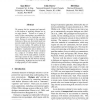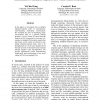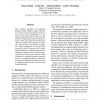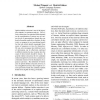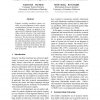NAACL
2010
13 years 9 months ago
2010
We propose the first unsupervised approach to the problem of modeling dialogue acts in an open domain. Trained on a corpus of noisy Twitter conversations, our method discovers dia...
NAACL
2010
13 years 9 months ago
2010
In this paper we investigate how to identify initiation-response pairs in asynchronous, multi-threaded, multi-party conversations. We formulate the task of identifying initiation-...
NAACL
2010
13 years 9 months ago
2010
Most learning algorithms for undirected graphical models require complete inference over at least one instance before parameter updates can be made. SampleRank is a rankbased lear...
NAACL
2010
13 years 9 months ago
2010
Semantic role labeling (SRL) not only needs lexical and syntactic information, but also needs word sense information. However, because of the lack of corpus annotated with both wo...
NAACL
2010
13 years 9 months ago
2010
Opinion holder extraction is one of the important subtasks in sentiment analysis. The effective detection of an opinion holder depends on the consideration of various cues on vari...
NAACL
2010
13 years 9 months ago
2010
Recent work has proposed the use of an extracted tree grammar as the basis for treebank analysis and search queries, in which queries are stated over the elementary trees, which a...
NAACL
2010
13 years 9 months ago
2010
Syntactic machine translation systems currently use word alignments to infer syntactic correspondences between the source and target languages. Instead, we propose an unsupervised...
NAACL
2010
13 years 9 months ago
2010
We address the challenge of automatically generating questions from reading materials for educational practice and assessment. Our approach is to overgenerate questions, then rank...
NAACL
2010
13 years 9 months ago
2010
This paper presents METEOR-NEXT, an extended version of the METEOR metric designed to have high correlation with postediting measures of machine translation quality. We describe c...
NAACL
2010
13 years 9 months ago
2010
This paper describes an efficient sampler for synchronous grammar induction under a nonparametric Bayesian prior. Inspired by ideas from slice sampling, our sampler is able to dra...
